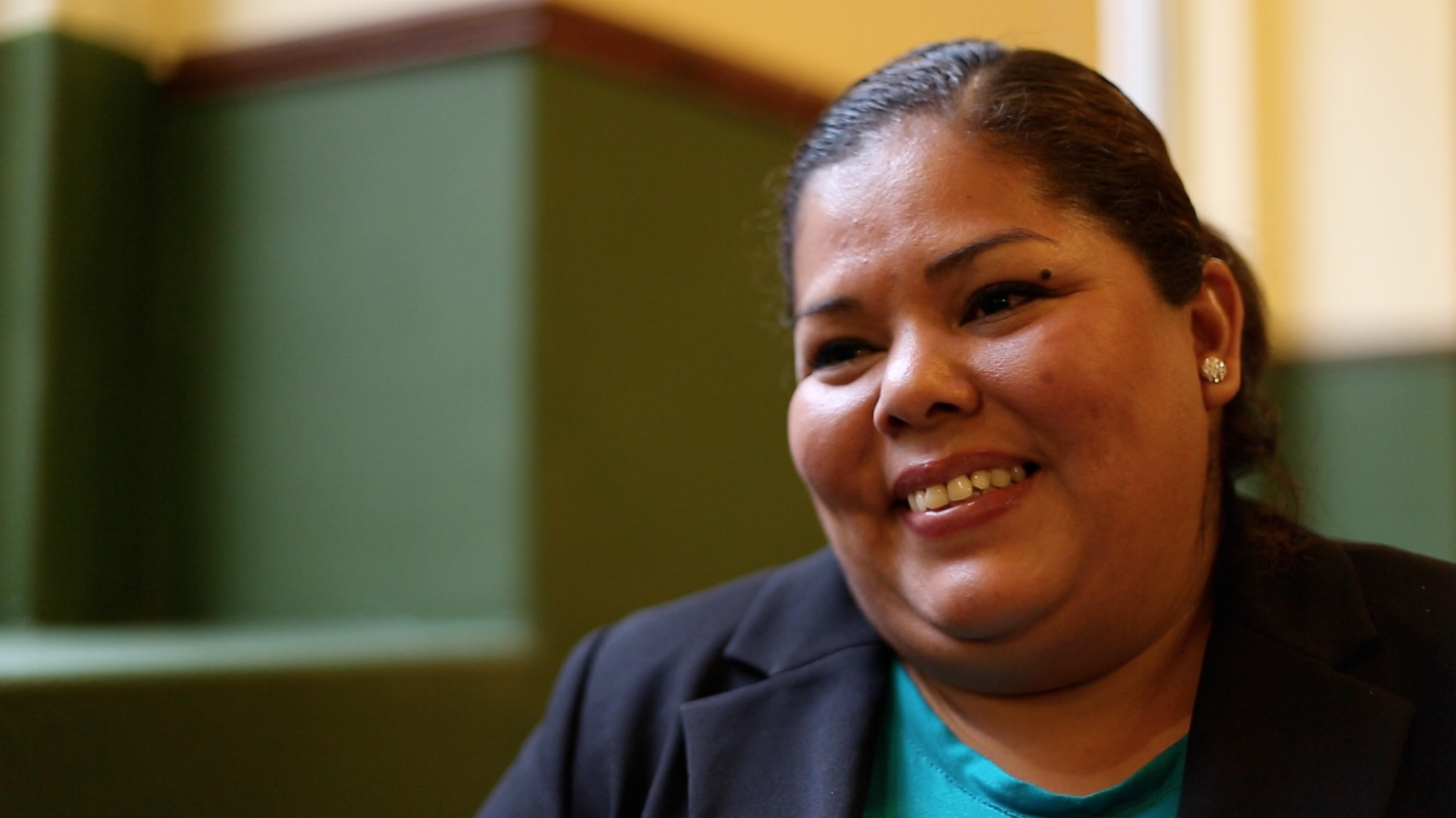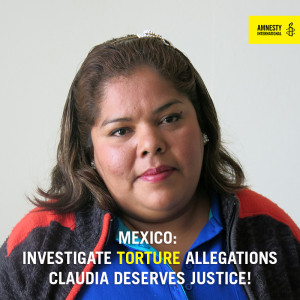
Claudia Medina Tamariz (c) Amnesty International
By Mariano Machain, Amnesty International’s campaigner on Mexico
I have seen Claudia Medina cry many times. She cried when she told me about the torture, including sexual abuse, she suffered at the hands of Mexican marines in 2012.
She also cried when she explained what it is like to live with federal charges pending over her head, accused of being a member of a criminal gang, facing the risk of being arrested again at any time. Then once more when she told me about how her children were suffering.
But today is the first time I have seen her cry out of joy and relief.
A judge has just dropped the last remaining charge against her, arguing that the sole piece of evidence –a report filed by the marines –is a lie. The judge confirmed that after her arrest Claudia was tortured and sexually assaulted by marines in order to force her to incriminate herself and others in drug-related crimes.
The offenses took place on 7 August 2012 at a Navy barracks in Veracruz state, Eastern Mexico.
“For two years I have lived with the accusations made against me which were based on the torture they inflicted on me. It has been very hard. At the beginning I used to see all this as a monster standing in front of me, something I thought I was not going to be able to overcome,” said Claudia.
“This affected me personally because everybody turned their backs on me. I was also unable to be a mum for my children 100 per cent. I was affected financially. I was not able to give my children what they were used to having and what they needed.”
On February 6, a judge informed her that the last remaining charge against her for illegal weapon possession had been dropped. “I feel a lot calmer now,” Claudia said just before a press conference hosted by Amnesty International in Mexico City.
“I’m now going to be able to travel around with much more freedom. Before, I used to walk thinking that I was going to be detained and tortured like before. But not anymore. I will hold my head high and say ‘I’m innocent and I have always told the truth’.”
But Claudia’s struggle for justice is far from over.
“My torture complaint is now with the Federal Attorney General’s Office. There have not been any advances but I will persist with this.”
The federal prosecutors say Claudia has to actively reconfirm that she would like to continue with the judicial investigation into her accusations of torture. This is outrageous. Torture is an extremely serious crime and authorities have the obligation to promptly investigate any complaints as soon as they are filed. This approach to justice shows how impunity is perpetuated.
According to official figur es, Mexico has only achieved seven torture convictions at the federal level since 1991; this despite the widely documented use of torture and ill-treatment by law enforcement agencies and the armed forces across the country.
es, Mexico has only achieved seven torture convictions at the federal level since 1991; this despite the widely documented use of torture and ill-treatment by law enforcement agencies and the armed forces across the country.
Last September, Amnesty International launched a report as part of its global Stop Torture Campaign looking at the substantial rise in the number of reported torture cases in the past decade and the incredibly few investigations carried out.
Its findings are backed up by the UN Special Rapporteur on Torture and other ill-treatment, who recently visited Mexico and defined the use of torture there as “widespread.”
One of the reasons for the lack of justice is the failure of the Federal Attorney General’s Office to carry out forensic medical examinations of possible victims in a prompt, adequate and impartial manner, as mandated by the UN-backed Istanbul Protocol which sets out guidelines for investigating torture allegations.
This was the case with Claudia. She was left with no choice but to reach out to independent forensic experts from a local NGO and from the National Human Rights Commission. Both their reports prove that Claudia’s allegations are consistent with her physical and psychological scars.
It remains to be seen whether the General Attorney’s Office will ever accept these independent medical examinations or if those who tortured Claudia will be brought to justice.
But despite all the challenges, Claudia has a positive outlook for the future.
“After this long process I had to go through I felt the need to become a human rights activist, to show that I’m not a criminal, as authorities portrayed me. I will not allow even one more woman to be tortured in Mexico.”
 Please join Claudia Medina, and thousands of Amnesty International activists around the world, in urging Mexico’s Federal Attorney General Jesús Murillo Karam to carry out a full, swift and independent investigation into her torture complaint.
Please join Claudia Medina, and thousands of Amnesty International activists around the world, in urging Mexico’s Federal Attorney General Jesús Murillo Karam to carry out a full, swift and independent investigation into her torture complaint.
Email him or send him a tweet using his handle @PGR_mx. Claudia deserves justice!
In May 2014, Amnesty International launched its global Stop Torture campaign to ensure that everyone be protected from torture. The organization is building on more than 50 years of experience to insist that governments live up to their promises and respect international law. It is urging people all over the world to demand a stop to torture.
Claudia's victory is well deserved. Her story is a timely reminder to us as all that the truth is that which defines our humanity and it should be protected and fought for.
I am waiting for the day when I will not hear news about how vulnerable women are tortured in any region of the world. It doesn't seem fair to take the character in this way, just because it fulminate with weaknesses, even if I am not a feminist person. The key will always be gender equality, regardless of what people think about the capabilities of each other.